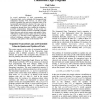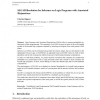345 search results - page 47 / 69 » Kripke models for classical logic |
COSIT
1999
Springer
13 years 12 months ago
1999
Springer
Previous recent research on human wayfinding has focused primarily on mental representations rather than processes of wayfinding. This paper presents a formal model of some aspect...
INFFUS
2010
13 years 2 months ago
2010
The problem of fusing beliefs in the Dempster-Shafer belief theory has attracted considerable attention over the last two decades. The classical Dempster's Rule has often bee...
AAAI
2008
13 years 10 months ago
2008
In several applications of logic programming and Transaction Logic, such as, planning, trust management and independent Semantic Web Services, an action might produce incomplete f...
FUIN
2010
13 years 6 months ago
2010
Abstract. Logic Programs with Annotated Disjunctions (LPADs) allow to express probabilistic information in logic programming. The semantics of an LPAD is given in terms of the well...
PLPV
2012
ACM
12 years 3 months ago
2012
ACM
Functional Reactive Programming (FRP) is a form of reactive programming whose model is pure functions over signals. FRP is often expressed in terms of arrows with loops, which is ...


